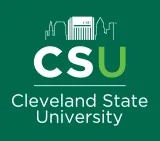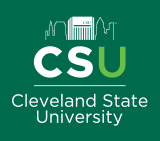Filter by program of interest
CSU’s Online Programs
Cleveland State University (CSU) is nationally recognized by esteemed organizations. Our online programs provide the flexibility you need with curriculum rigor and ongoing support in tandem with dedicated faculty and experiential learning opportunities. Our online programs are offered primarily in asynchronous formats, so you don't have to put your personal and professional life on hold while developing your career to its fullest potential. With world-class partners in healthcare, the arts and other industries, CSU shares knowledge, research and resources to make a positive and meaningful difference.
Nursing Programs

Make a Difference as an RN
Leverage your bachelor’s degree in any field and prepare to become a nurse through our affordable, fast-paced degree pathway.
- 69 credit hours
- 734 clinical hours and 201 lab hours
- Two residencies
- Two intakes per year (Spring & Fall)
- 16 months/four semesters (full-time)
- CCNE accredited
- Bachelor’s degree
- 2.50 cumulative GPA, 3.0 prerequisite GPA
- Prerequisite courses
- Essay
- Interview
- Two letters of recommendation
- Resume
- Transcripts
Now Accepting Applications for Fall 2026
Application deadline: May 1, 2026
Next start date: August 22, 2026

Provide Compassionate Primary Care
Prepare as an advanced practice registered nurse to provide care across the lifespan.
- 47 credit hours
- 780 clinical hours
- One residency
- Three intakes per year (Fall, Spring, Summer)
- Two years/six semesters (full-time)
- CCNE accredited
- BSN degree
- 3.0 GPA
- Statistics – Grade of C or better, undergraduate or graduate level
- Active RN license – unencumbered
- Resume
- Personal essay
- Letter of recommendation (no personal references)
- Transcripts
Next application deadline: April 13, 2026
Next start date: May 16, 2026
**Seats are Limited**

Advocate for Populations in Need
Expand your nursing skills to specialize in the mental health care and well-being of patients of all ages.
- 48 credit hours
- 780 clinical hours
- Three intakes per year (Fall, Spring, Summer)
- Two years/six semesters (full-time)
- CCNE accredited
- BSN degree
- 3.0 GPA
- Statistics – Grade of C or better, undergraduate or graduate level
- Active RN license – unencumbered
- Resume
- Personal essay
- Letter of recommendation (no personal references)
- Transcripts
Next application deadline: April 13, 2026
Next start date: May 16, 2026
**Seats are Limited**

Influence Patient Outcomes
Become an effective leader in clinical settings and ensure patients benefit from the latest innovations in care delivery across the continuum.
- 32 online credit hours
- 500 practicum hours
- Fall intake
- 1 year and 7 months/5 semesters (part-time)
- CCNE accredited
- BSN
- 3.0 GPA
- Undergraduate statistics course (C or better)
- Essay
- 2 letters of recommendation
- Resume
- Active RN license
- Transcripts
Now accepting applications for Fall 2026

Advocate in Medico-Legal Cases
Combine your nursing skills with forensic science to promote recovery, health and justice in a caring and compassionate way.
- 38 online credit hours
- 500 practicum hours
- Fall intake
- 2 years/6 semesters (part-time)
- CCNE accredited
- BSN
- 3.0 GPA
- Undergraduate statistics course (C or better)
- Essay
- 2 letters of recommendation
- Resume
- Active RN license
- Transcripts
Now accepting applications for Fall 2026

Lead Beyond the Bedside
Establish yourself as an accomplished educator and influence new generations of nurses through effective teaching methods.
- 38 online credit hours
- 500 practicum hours
- Fall intake
- 2 years/6 semesters (part-time)
- CCNE accredited
- BSN
- 3.0 GPA
- Undergraduate statistics course (C or better)
- Essay
- 2 letters of recommendation
- Resume
- Active RN license
- Transcripts
Now accepting applications for Fall 2026
Social Work Programs

Shortest Advanced Standing Pathway in Ohio
Balance your professional and personal life as you earn your degree part-time.
- 30 online credit hours
- 500 field practicum hours
- 3 intakes per year
- 4 to 5 semesters/1 year and 3 months to 1 year and 7 months (part-time)
- 2 to 4 semesters/7 months to 1 year and 3 months (full-time)
- CSWE accredited
- Bachelor of Social Work (from a CSWE-accredited program within the last 7 years)
- 2.75 cumulative GPA
- Official transcripts of all undergraduate and graduate coursework
- 2 letters of recommendation
- Essay
- Copies of BSW field evaluations
Accepting applications for Summer 2026
Next application deadline: March 16, 2026
Next start date: May 16, 2026

Serve Your Community
Start a rewarding new career in social work.
- 60 online credit hours
- 900 field practicum hours
- 3 intakes per year
- 5 to 6 semesters/1 year and 7 months to 2 years (full-time)
- 8 to 10 semesters/2 years and 7 months to 3 years and 3 months (part-time)
- CSWE accredited
- Bachelor’s degree
- 2.75 GPA
- Transcripts of all undergraduate and graduate coursework
- 2 letters of recommendation
- Essay
Accepting applications for Summer 2026
Next application deadline: March 16, 2026
Next start date: May 16, 2026
Law Program

Learn Law. Live Justice.
Expand your skill set as a lawyer or fulfill your goal of becoming an attorney to advocate for others with this affordable part-time program.
- 90 online credit hours
- Ample experiential learning opportunities
- Fall intake
- In as little as three years and five months/10 semesters (part-time)
- ABA accredited
- Completed bachelor’s degree from an accredited college or university
- Final transcript showing degree conferral to the Law School Admissions Council’s Credential Assembly Service (CAS)
- LSAT or GRE score
- Personal statement
- Provide a minimum of two (and a maximum of three) letters of recommendation
- Resume
- Study plan: how will you fit in 30 hours of study and class time per week?
- Optional statement: additional information about your relevant educational and professional experiences or unique qualifications that demonstrate your ability to success in law school (include as a separate statement)
- Character and fitness: you are required to disclose and submit a statement of all relevant facts pertaining to any and all probations, suspensions, warnings, sanctions and dismissals by any college or university for academic or non-academic reasons; criminal charges pending against you; convictions or granted deferred adjudications or diversions for any offense, felony or misdemeanor, including traffic offenses
Now accepting applications for Fall 2026
Application deadline: June 1, 2026
*Seats are limited
Communication Sciences Programs

Champion Communication.
Prepare for a career as a professional Speech-Language Pathologist with high-quality, career-ready education.
- 66 – 72 credit hours
- Full-time program can be completed in 1 year and 8 months (5 semesters)
- 400 total hours: 375 practicum hours PLUS 25 observation hours
- One residency
- Two intakes per year (Fall, Spring)
- Optional Teaching License pathway available
- Accredited by the Council on Academic Accreditation of the American Speech-Language-Hearing Association (CAA)
- Bachelor's degree in Communication Sciences and Disorders related field OR a bachelor's degree in a different field and successful completion (C or higher) of prerequisite coursework from an accredited university
- Three letters of recommendation
- 3.0 GPA (will consider applicants with a 2.75 and above)
- Statement of purpose
- Interview
Now accepting applications
Application deadline: May 1, 2026
**Seats are Limited**






